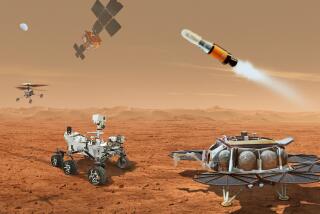Need for Foreign Financing Jeopardizes Super Collider : Science: President Bush leaves Tokyo without a firm commitment to help fund the $8-billion atom-smasher. Support in Congress is waning.
- Share via
WASHINGTON — The failure of President Bush to extract a Japanese commitment to help finance an $8.2-billion atom-smasher in Texas has put the project in serious jeopardy in what may be a make-or-break year for the superconducting super collider.
Japanese backing has long been viewed as a prerequisite to the project’s completion, and Bush Administration officials were expecting Tokyo to pledge as much as $1.5 billion during the President’s just-ended visit.
But the announcement that Tokyo had merely formed a working group to further study any Japanese involvement in the project left some super collider supporters here stunned.
“The super collider is in a precarious position. Without Japanese participation, it will go down the tubes,” Rep. George E. Brown Jr. (D-Colton), chairman of the House Science, Space and Technology Committee, said Thursday.
“We’re going to have to persuade Congress that this program is so important that it must be done even without international support,” added Fred Bucy, who resigned last summer as chairman of the Texas National Research Laboratory Commission while urging Washington to abandon any pretense that significant foreign contributions were a realistic expectation.
Convincing lawmakers that the United States should go it alone, however, may be an uphill struggle because Congress has been voting by increasingly narrow margins in recent years in support of the project, which some say has become a serious drain on many vital science programs.
Japanese support for the super collider, designed to study the basic forces of nature, is considered indispensable because both the Ronald Reagan and Bush administrations have acceded to congressional demands that the project obtain at least one-third of its funding from non-federal sources.
So far, India is the only country to announce its support, pledging $50 million; Texas, the host state, is spending $1 billion. That leaves a shortfall of about $1.7 billion. The European nations have their own atom-smasher and are not expected to help with the U.S. project.
“I think we can start writing the obituary,” Rep. Sherwood Boehlert (R-N.Y.), a critic of the high-energy physics project, told the Associated Press.
The Department of Energy, which manages the project, and D. Allan Bromley, the White House science adviser, declined to comment Thursday. But other super collider backers sought to put the latest development in the best light.
A spokesman for Rep. Joe L. Barton (R-Tex.), in whose district the super collider would be located, said that the newly announced working group is an inevitable step toward Japanese participation. “Japan’s not going to set up a working group if it’s not going to participate,” he said.
In recent months, Bromley and Energy Secretary James D. Watkins, among others, have gone to Tokyo to lobby for the project. In an interview shortly before leaving for Tokyo in October, Bromley conceded that time was becoming “critical” for getting a firm Japanese commitment to demonstrate to Congress that “there is (foreign) support.”
Congressional opposition to the super collider has grown as the project’s budget requests have risen. Last summer, Congress appropriated $483.7 million for fiscal year 1992, or $50 million less than the President had requested.
And that was only after a Senate proposal to kill the super collider won 37 votes. Afterward, Sen. Malcolm Wallop (R-Wyo.), a super collider backer, warned: “It will be much more difficult to support this project next year if there are no firm foreign commitments.”
The lack of a Japanese commitment now “reinforces the growing reservations that were manifested the last time Congress voted,” Rep. Howard Wolpe (D-Mich.), chairman of the House investigations and oversight subcommittee of the House Science, Space and Technology Committee, said Thursday.
The super collider, scheduled for completion in 1999, would be the world’s largest scientific instrument and most powerful particle accelerator. Using thousands of magnets still being developed, it would hurl beams of protons around a 54-mile oval tunnel underground at great speed, forcing them eventually to collide.
By studying the resulting debris--subatomic particles that make up all matter--physicists would hope to learn more about the fundamental properties of matter and energy, possibly uncovering clues about the origins of the universe.
The super collider began as a strictly American project. But as the cost rose steeply--starting from just over $4 billion--Washington began searching for foreign partners, targeting Japan from the outset as the prime contributor.
Bromley last fall even offered to make Japan part owner of the project.
But he has conceded that the Japanese have good reason to shun such blandishments. They were outraged, for instance, when the National Aeronautics and Space Administration unilaterally redesigned the space station, even though they were to build a major component.
Many Japanese scientists also oppose backing the super collider because they want Tokyo to increase spending for basic research in their own country.






